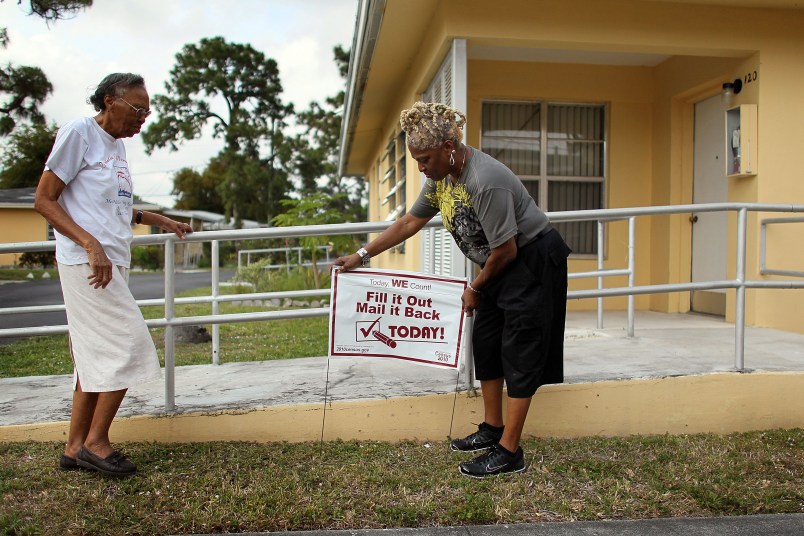The Trump administration on Monday evening announced that it was making a controversial change to the upcoming 2020 Census that experts say could lead to an undercount — particularly among minority and urban communities.
For the first time in decades, the Census will ask survey-takers their citizenship status, Commerce Secretary Wilbur Ross said in a memo. The change was made at the request of the Justice Department.
Already, civil rights groups and Democrats say they will sue over the change.
“Make no mistake – this decision is motivated purely by politics. In deciding to add this question without even testing its effects, the Administration is departing from decades of census policy and ignoring the warnings of census experts,” former Attorney General Eric Holder said in a statement.
Internal research at the Census bureau has shown that the question discourages participation in the survey, even among citizens who perhaps live with undocumented immigrants.
An undercount would have major political implications. Depressed participation among immigrant communities would shift political power to rural and white populations, who would see their political representation grow. It would also affect how resources — including $675 billion in annual federal funding that’s divvied out based on Census data — are allocated. Private businesses too depend on Census data to for planning of their operations.
The change also brings logistical obstacles. The Census is in its final stages of planning — the bureau this month is in the midst of its only end-to-end test of the survey — and already other major changes are being implement for the 2020 Census, including the use of an online version of the survey.
Ross, in the memo announcing his decision, said he studied all those concerns.
“I find that the need for accurate citizenship data and the limited burden that the reinstatement of the citizenship question would impose outweigh fears about a potentially lower response rate,” Ross said.
The Justice Department has claimed that it needs the citizenship data for lawsuits involving the Voting Rights Act. But civil rights groups are extremely skeptical of that justification. For one, the Department has for years used the American Community Survey for its Voting Rights Act litigation without issue. Secondly, the Trump administration has already, in multiple cases, put itself on the side of the defendants, rather than those challenging restrictive election laws on the basis of the Voting Rights Act.
ProPublica, which first reported Ross was considering the change, also revealed that the Justice Department official who had pushed for the request was Acting Attorney General for Civil Rights John Gore, who in his private career, defended Republicans in election lawsuits.
Almost immediately after the move was announced, numerous groups announced they would be filing lawsuits challenging the move.
“We’re prepared to do what we must to protect California from a deficient census,” California Attorney General Xavier Becerra said. “Including a citizenship question on the 2020 census is not just a bad idea — it is illegal.”
New York Attorney General Eric T. Schneiderman said in a statement Tuesday that he would be leading a multi-state lawsuit to fight the move.
The National Democratic Redistricting Committee, which is led by Holder, also announced its plans to litigate the move, while the Leadership Conference on Civil and Human Rights called on Congress to overturn the Trump administration’s decision.
Meanwhile, proponents of stricter voting laws celebrated the move. A statement from J. Christian Adams — the president of the Public Interest Legal Foundation and a member of President Trump’s now defunct voter fraud commission — suggested that the change could revive the conservative push for legislative districts to be drawn based on number of citizens rather that total population. (The Supreme Court ruled in 2016 that total population was permissible).
“It’s critical that the next redistricting cycle account for the citizen residents of districts so urban centers do not unfairly profit from the political subsidy that higher noncitizen populations provide,” Adams said. “This carries the nation one step closer to preventing against actual foreign influences in our elections.”







Must be the dreaded Kobach clause…
It’s all about depressing population figures for Democratic areas.
So what happens if everyone just says yes, I’m a citizen.
Motto of the GOP: when you know you’re gonna lose by playing fair, cheat. Since you never know when you’re gonna lose, cheat all the time, just to be safe.
One must truly be astonished at the brazen manner in which the Republican Party will do anything to depress voting and congressional representation by anyone who isn’t Republican. Extreme gerrymandering? Cheok. Restrictive voting ID? Check. Cutting back on early voting? Check. Purging voter rolls? Check. Now it’s just not counting people by subtly discouraging them from filling out a census form.
Is there any institution with a greater hatred of democracy than the GOP?